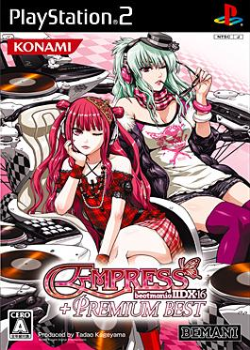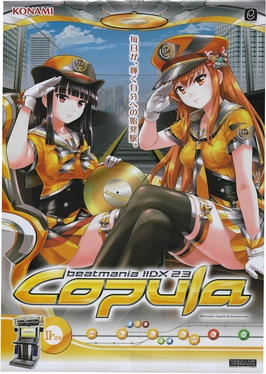Dance Dance Revolution (DDR) is a music video game series produced by Konami. Introduced in Japan in 1998 as part of the Bemani series, and released in North America and Europe in 1999, Dance Dance Revolution is the pioneering series of the rhythm and dance genre in video games. Players stand on a "dance platform" or stage and hit colored arrows laid out in a cross with their feet to musical and visual cues. Players are judged by how well they time their dance to the patterns presented to them and are allowed to choose more music to play to if they receive a passing score.

Beatmania IIDX (IIDX) is a series of rhythm video games, that was first released by Konami in Japan on 26 February 1999. Beatmania IIDX has since spawned 31 arcade releases and 14 console releases on the Sony PlayStation 2. It is the sequel to the beatmania game series, and is part of the Bemani line of music games.
Bemani, stylized as BEMANI, is Konami's music video game division. Originally named the Games & Music Division (G.M.D.), it changed its name in honor of its first and most successful game, Beatmania, and expanded into other music-based games, most notably rhythm games such as Dance Dance Revolution, GuitarFreaks, and DrumMania.

Pop'n Music, commonly abbreviated as Pop'n, PM or PNM and stylized as pop'n music, is a music video game series in the Bemani series made by Konami. The games are known for their bright colors, upbeat songs, and cute cartoon character graphics. Originally released in 1998, the series has had 22 home releases in Japan as well as 30 mainline arcade versions.

Yoshitaka Nishimura (西村宜隆), better known as DJ Yoshitaka, is a composer for Konami's line of Bemani games. He has been making solo songs since the release of Beatmania IIDX 11: IIDX Red, though he has had previous Bemani involvement as a member of Osamu Migitera's Des-ROW group. He often composes for the Beatmania IIDX and the Pop'n music series, and then began composing for the Guitar Freaks & DrumMania and the Dance Dance Revolution series in 2005 and 2007, respectively. DJ Yoshitaka still often works with Des-ROW for some Pop'n music songs. In the Reflec Beat series, DJ Yoshitaka regularly appears alongside fellow composer Sota Fujimori as a double act, Venus.

Dance Dance Revolution Extreme is a music video game by Konami and is the eighth release in the main Dance Dance Revolution (DDR) series. It was released on December 25, 2002, for Japanese arcades, on October 9, 2003, for the Japanese PlayStation 2, and on September 21, 2004, for the North American PlayStation 2. This game is the ninth release in North America, but despite having the same name as its Japanese counterpart, its gameplay and soundtrack is significantly different and won the Video Music Awards in 2005 on MTV for Best Video Game Soundtrack.

beatmania IIDX 10th Style is the tenth game in the beatmania IIDX series of music video games. It was released in arcades by Konami in early 2004.

Beatmania IIDX 9th Style is the ninth game in the beatmania IIDX series of music video games. It was released in arcades by Konami in 2003. The game features over 50 new songs, some of which can be unlocked using Konami's e-Amusement platform – which made its official debut on 9th Style.

beatmania IIDX 7th Style is the seventh game in the beatmania IIDX series of music video games. It was released in arcades by Konami in March 2002.

Beatmania IIDX 6th Style is the sixth game in the beatmania IIDX series of music video games released in arcades by Konami in 2001 and features 40 new songs. 6th Style introduced new features such as letter grades and the new hard mode.

beatmania IIDX 5th Style is the fifth game in the beatmania IIDX series of music video games. It was released in arcades by Konami in 2001. The game features 35 new songs, five of which are hidden. New features introduced in this version are auto-scratch, as well as two more Hi-Speed settings 5th Style's songlist featured the first songs that would later become "flashing 7s", here differentiated from regular 7s with a kanji meaning "forbidden".

beatmania IIDX 3rd Style is a music video game developed by Bemani and published by Konami, initially released as an arcade game in Japan on February 25, 2000, and subsequently ported to the PlayStation 2 on November 2. 3rd Style removed the 4-keys mode from previous installments and replaced it with the Light7 difficulty, giving most songs a fully separate, easier notechart. The game also introduced Free Mode and Extra Stage, and featured a new aesthetic.

Beatmania IIDX is an arcade music video game developed by Bemani and published by Konami. It was released in Japan on February 26, 1999. The objective is to perform songs using a controller with seven keys and a turntable. After the surprise success of Beatmania, Benami conceived IIDX to simulate an actual disc jockey (DJ) live performance. Its arcade cabinet contains a widescreen monitor, speakers, and eight spotlights. Bemani later developed several updated versions of IIDX to increased success. The game retrospectively received a positive reception from video game publications for its gameplay and increased difficulty. A sequel, Beatmania III, was released in 2000.

Beatmania IIDX 16: Empress is the 16th game in the Beatmania IIDX series of music video games. It was released in arcades by Konami on November 19, 2008. The game features over 50 new songs, some of which are unlocked over Konami's e-Amusement platform. The design of Empress's interface is based on a pink color scheme, dominated by sparkles, butterfly wings, and motifs of royalty and jewellery. A PlayStation 2 port for the game was released on October 15, 2009, in Japan.

Beatmania IIDX 18 Resort Anthem is a music video game in the Beatmania IIDX series of games by Konami. On April 19, 2010, Bemani fansite Zenius -I- Vanisher reported that Konami had announced the first location test for the newest game in the IIDX series. The location test ran from April 22 to April 26 at the Cat's Eye Machida (キャッツアイ町田) in Machida, Tokyo. Follow-up location tests ran in Chōfu, Tokyo and Kyoto from April 30 to May 6, in Nagoya and Sapporo from May 14 to May 20 and in Chiyoda, Tokyo from June 11 to June 12. The game was released on September 15, 2010 This Beatmania iteration's theme focuses heavily on a futuresque modern relaxation and tropical beach resort concert-like setting, with the interface making use of sleek mechanical components with simple whites and bright colors that are easy on the eyes.

Beatmania IIDX 19: Lincle is the 19th game in the beatmania IIDX series of music video games. The location test itself was announced on April 18, 2011. The location test was held first on Akihabara on April 20, 2011. Umeda's location test started on April 22, 2011, and both ended on April 25, 2011. Fukuoka and Nagoya had their location test started from April 28, 2011 until May 1, 2011. Kyoto and Sapporo's location test started on May 6, 2011 until May 8, 2011. It was released on September 15, 2011.

Beatmania IIDX 21: Spada is a music video game and the 21st installment of Beatmania IIDX series of video games. The main motif of the game revolves around swords, as the title of the game, Spada is Italian for sword. The UI has a medieval fantasy theme and mainly features black, brown, and red colors. It was first announced on June 12, 2013. Location tests began in Akihabara on June 14, 2013 and ended on June 16, 2013. It was released on November 13, 2013.

Beatmania IIDX 22: Pendual is a music video game and the 22nd installment of Beatmania IIDX series of video game, a part of the long-running Bemani series. The theme of the game revolves around the concept of time with the theme split between the present and the future; Pendual itself is a portmanteau of "pendulum" and "dual". The UI mainly features white to symbolize the present and purple to symbolize the future. It was first announced during the BEMANI Namahōsō event on June 4, 2014, with location testing held from June 13 to 15, 2014. It was released on September 17, 2014.

Beatmania IIDX 23: Copula is the 23rd installment of the Beatmania IIDX series. The first location test was held at the Tokyo Lesiure Land #2 location in Akihabara, Japan from July 10 through July 12, 2015. It was released on November 11, 2015. It was the last entry in the Beatmania series made by Konami Digital Entertainment before the division was renamed Konami Amusement.

Beatmania IIDX 27: Heroic Verse is the 27th installment of the Beatmania IIDX series. It takes on the theme of superheroes within a rhythm game multiverse, and was the first arcade game in its series to have an official release in North America.























